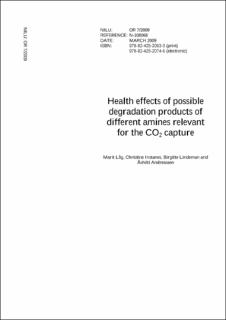| dc.description.abstract | The toxicity studies of the amines, MEA, piperazine, AMP and MDEA, together with relevant groups of degradation products, nitrosamines, nitramines, aldehydes and amides, have been evaluated. However, the toxicological data are generally sparse. The amines, and the degradation products aldehydes and amides, seem to be irritative, piperazine is also reported to be sensitizing. For piperazine and MEA there are indications of reproductive and developmental toxicity. The aldehydes; formamide and acetamide, have in experimental animals induced developmental toxicity and carcinogenicity, respectively. Based on experimental data some nitrosamines are extremely potent carcinogens. Several of the nitramines are mutagenic and carcinogenic in rodents, although they seem considerably less potent than the corresponding nitrosamines. The suggested exposure guidelines for the amines are based on the available literature. Particularly for AMP and MDEA there are few high quality studies. We suggest that the general population, over time, should not be exposed to levels in the air higher than 10 μg/m^3 MEA, 5 μg/m^3 piperazine base, 6 μg/m^3 AMP or 120 μg/m^3 MDEA. These values should be used as an indication and not as limit values for safety. Furthermore, it is desirable to reduce the human exposure of nitrosamines to an absolute minimum. Due to the serious effects of nitramines, exposure should also be kept at a low level. The irritating potential of the amines, aldehydes and amides may be the most relevant adverse health effect. Therefore, all these compounds have to be evaluated together with respect to irritating potential of the air around the CO2 capture plants. | |
